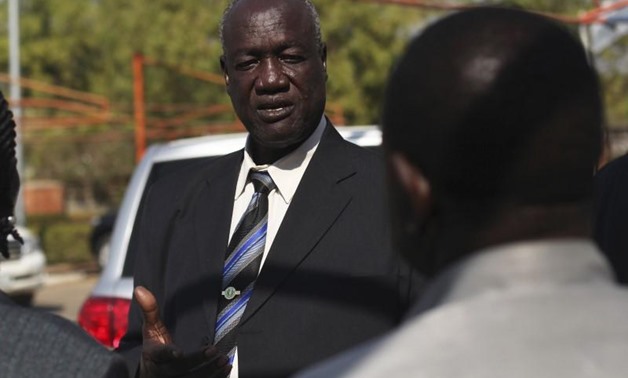
FILE PHOTO - South Sudan's Defence Minister Kuol Manyang Juuk, talks to cabinet members after a cabinet meeting in Juba January 17, 2014. REUTERS/Andreea Campeanu.
UNITED NATIONS (Reuters) - The U.N. Security Council voted on Thursday to renew some sanctions on South Sudan through mid-July and to consider imposing travel bans and asset freezes on six South Sudanese leaders if the country’s conflict does not stop by June 30.
The resolution, approved by a 9-0 vote with six abstentions, was a watered-down version of a draft measure proposed by the United States, whose ambassador, Nikki Haley, wrote in The Washington Post on Wednesday that the administration had “lost patience with the status quo” in South Sudan.
“What we need now is concrete action by the full international community to hold these warring parties accountable,” Haley said in impassioned remarks before the vote.
She called the resolution a “modest step” that would extend sanctions for 45 days and demand a cessation of hostilities.
Critics of the resolution argued that the measure came at a sensitive time in peace talks led by the Intergovernmental Authority on Development, or IGAD, and was rushed through the council with little consultation with the region
Ethiopia, which has helped lead South Sudan’s peace talks, China and Russia all abstained from voting, as did other countries. France and Britain supported the move, which needed nine votes to pass.
Ethiopia’s U.N. ambassador, Tekeda Alemu, said before the vote he understood U.S. frustration with the situation in South Sudan but opposed the measure.
“At a time when IGAD is at a very critical moment ... the adoption of the draft resolution tabled before us will be detrimental to the process. It is a very, very tragic development indeed,” he said.
The resolution said absent a cessation of hostilities by June 30, the council would consider freezing the assets and banning travel for six officials, including Defense Minister Kuol Manyang Juuk, former army chief Paul Malong, Minister of Information Michael Lueth, and deputy chief of defense for logistics in the South Sudan Army Malek Reuben Riak Rengu.
It also targeted Koang Rambang, governor of Bieh State, who the United States accused of leading military attacks and obstructing aid to civilians; and cabinet affairs minister Martin Elia Lomuro.
South Sudan, which split off from its northern neighbor Sudan in 2011, has been gripped by a civil war sparked by political rivalry between President Salva Kiir and his former deputy Riek Machar.


Comments
Leave a Comment